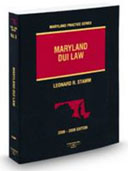The United States District Court for the Southern Division of Maryland in Greenbelt issued its first ruling Friday granting a defense motion to suppress a warrantless blood test as a result of the Supreme Court decision in Missouri v. McNeely. Magistrate Judge Thomas M. DiGirolamo issued a 19 page written opinion holding that McNeely applied to cases pending at the time of its issuance, that the Government did not demostrate sufficient exigent circumstances to justify dispensing with a warrant, and that the Fourth Amendment exclusionary rule did apply in the case of United States v. Brown, 2013 U.S. Dist. LEXIS 147352 (D. Md. October 11, 2013).
The opinion stated:
The government asserts that this case falls within the exigent circumstances exception. Specifically, it points to the 30 minute delay in the taking of the defendant’s blood due to the defendant’s failure to cooperate with the breath test at the station. The Court does not find that said delay combined with the natural dissipation of blood-alcohol brings this case within the exigent circumstances exception. This is simply not a case where the exigencies of the situation were so compelling to excuse the need for a warrant. Officer Weisbaum described this incident as a “routine” DWI stop. While this alone does not mean a warrant is required, it is a “special fact” to be considered. See McNeely, 133 S.Ct. at 1568. Additionally, unlike Schmerber, time did not have to be taken to investigate an accident or attend to the suspect’s personal injuries. There was nothing about the defendant’s physical or mental condition, or behavior, which required the expenditure of time in addition to what would normally be expended in a routine DWI stop. Officer Weisbaum testified that it is common for defendants to at first agree to cooperate with the breath test and then not blow sufficiently, resulting in a failed test. The Court does not find that the totality of the circumstances present in this case constitute such an emergency to excuse the officer from obtaining a warrant prior to the taking of the defendant’s blood. Given that the defendant did not consent to the blood test, the Court finds the taking of his blood was in violation of the Fourth Amendment.
There remain pending in Greenbelt a number of unresolved motions to suppress due to the policy of the U.S. Park Police to obtain blood samples in DUI cases without first seeking a warrant prior to the Supreme Court’s decision in Missouri v. McNeely, on April 17, 2013. The U.S. Park Police was one of a very small number of jurisdictions in the United States that followed the practice of getting blood samples from DUI suspects without first getting a warrant. The vast majority of states that obtained blood samples were already seeking and getting judicially issued warrants before drawing blood in DUI cases.
If you are facing criminal or traffic charges in Maryland state or
federal court, call Leonard R. Stamm of Goldstein
& Stamm, P.A. at 301-345-0122 for a free consultation.
Leonard R. Stamm
Goldstein & Stamm, P.A.
6301 Ivy Lane, Suite 504
Greenbelt, MD 20770
301-345-0122
(fax) 301-441-4652
www.dwiattorneymaryland.com
https://www.marylandduilawyer-blog.com
marylandduilaw@gmail.com
Author: West’s Maryland DUI Law

 Maryland DUI Lawyer Blog
Maryland DUI Lawyer Blog

